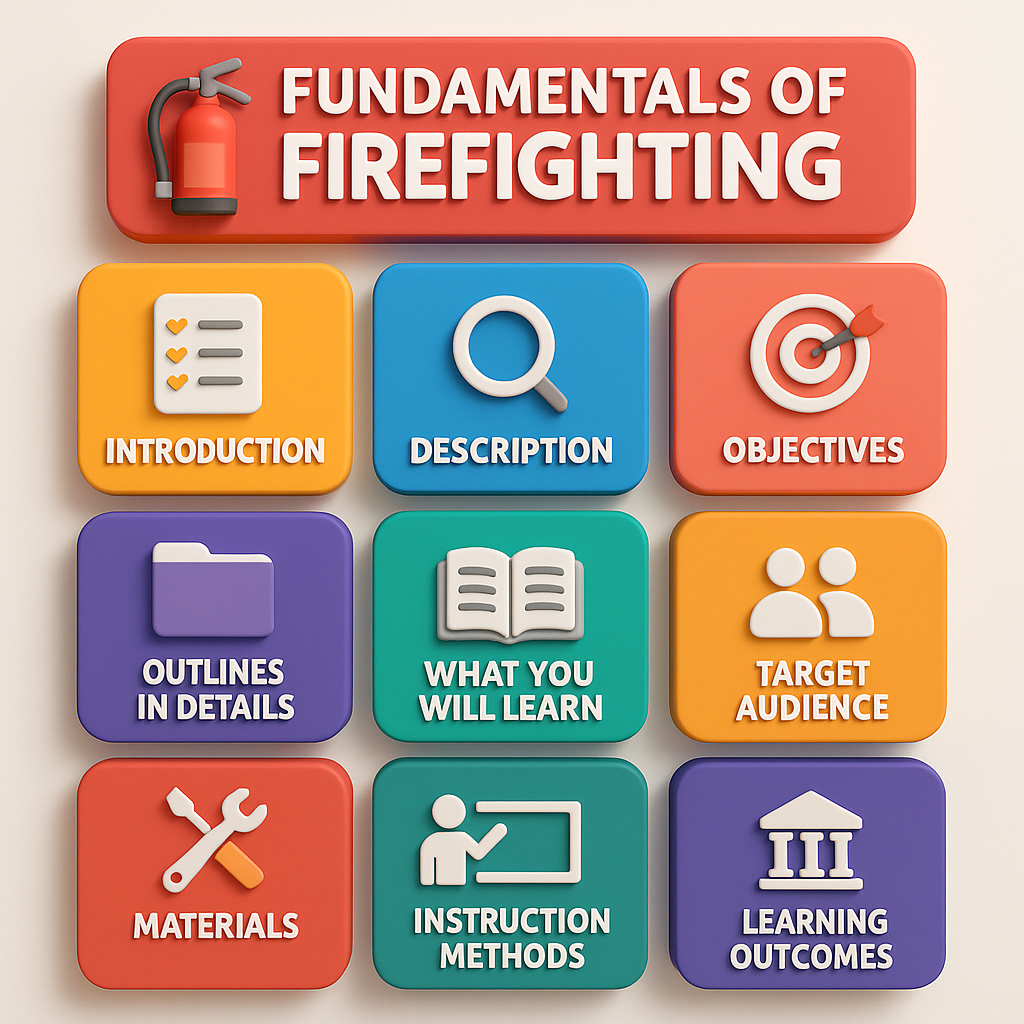About Course
Fundamentals of Firefighting
Code: 2073-MECH
📝 Introduction
Firefighting is a critical discipline that focuses on the prevention, control, and suppression of fires. This course provides foundational knowledge and skills required to respond effectively to fire emergencies, emphasizing safety, equipment use, and teamwork.
🔎 Description
The course covers essential firefighting concepts, including fire chemistry, types of fires, personal protective equipment (PPE), extinguishing agents, fire suppression techniques, rescue operations, and incident command. The program integrates theoretical learning with practical drills.
🎯 Objectives
- To provide a comprehensive understanding of fire behavior and dynamics
- To develop practical skills in using firefighting equipment and PPE
- To instill knowledge of fire prevention, suppression, and rescue techniques
- To foster a safety-first mindset and teamwork in emergency response
🗂️ Outlines in Details
- Introduction to Fire Science
- Fire triangle and tetrahedron
- Classes of fire (A, B, C, D, K)
- Fire Behavior and Dynamics
- Heat transfer methods
- Stages of fire development
- Firefighting Equipment and PPE
- Types of extinguishers and agents
- PPE: helmets, turnout gear, SCBA
- Fire Suppression Techniques
- Direct and indirect attack
- Water, foam, dry chemical, CO₂ applications
- Rescue and Evacuation
- Search and rescue methods
- Victim handling and evacuation procedures
- Incident Command System
- Roles and responsibilities
- Communication and coordination
- Fire Prevention and Safety
- Inspection and hazard identification
- Fire safety planning and drills
- Practical Drills
- Equipment handling
- Simulated fire scenarios
📚 What You Will Learn
- Principles of fire science and behavior
- Use of firefighting equipment and extinguishing agents
- Personal and team safety protocols
- Rescue and evacuation procedures
- Incident management and coordination
👥 Target Audience
- Fire service recruits and volunteers
- Industrial safety officers
- Emergency response teams
- Students in safety engineering or disaster management
🛠️ Materials
- Course manual and safety guides
- PPE for hands-on practice
- Fire extinguisher and equipment sets
- Multimedia training modules
🧑🏫 Instruction Methods
- Classroom lectures and presentations
- Hands-on practical sessions
- Simulation-based training
- Group exercises and scenario-based assessments
⏳ Time Frame
- Duration: 24 hours (6 sessions, 4 hours each)
🏛️ Course Format
- In-person or blended format
- Theory and practical components
- Continuous assessment and final evaluation
🎓 Learning Outcomes
Upon successful completion, participants will:
- Demonstrate proficiency in identifying fire types and selecting appropriate extinguishing methods
- Safely use firefighting equipment and PPE
- Perform basic rescue and evacuation
- Apply incident command principles in fire emergencies

